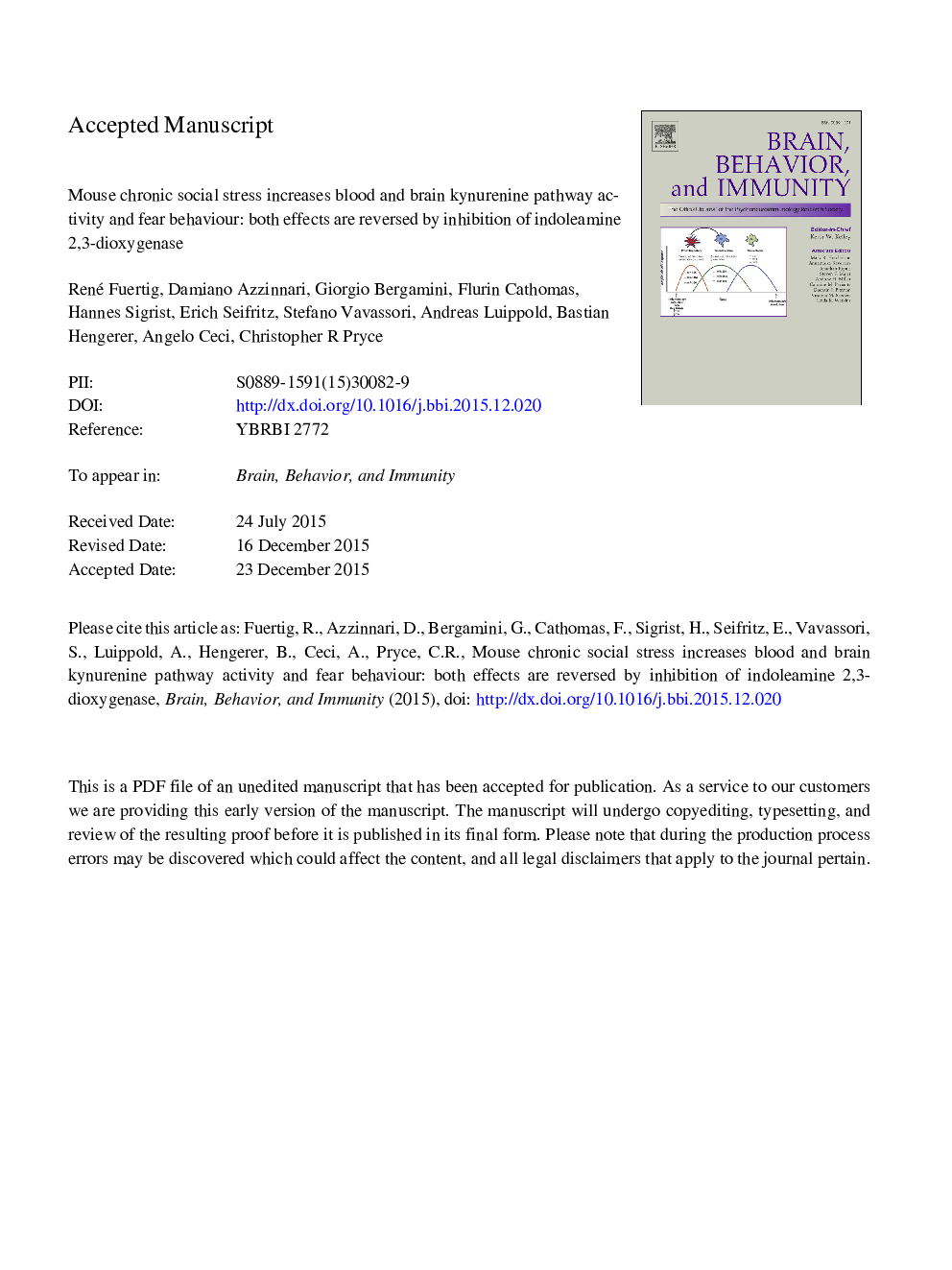| کد مقاله | کد نشریه | سال انتشار | مقاله انگلیسی | نسخه تمام متن |
|---|---|---|---|---|
| 7280429 | 1473913 | 2016 | 57 صفحه PDF | دانلود رایگان |
عنوان انگلیسی مقاله ISI
Mouse chronic social stress increases blood and brain kynurenine pathway activity and fear behaviour: Both effects are reversed by inhibition of indoleamine 2,3-dioxygenase
ترجمه فارسی عنوان
استرس مزمن اجتماعی ماوس موجب افزایش فعالیت مسیر کینورینین خون و مغز و رفتار ترس می شود: هر دو اثر با مهار ایندولامین 2،3-دیوکسریگناز
دانلود مقاله + سفارش ترجمه
دانلود مقاله ISI انگلیسی
رایگان برای ایرانیان
کلمات کلیدی
موضوعات مرتبط
علوم زیستی و بیوفناوری
ایمنی شناسی و میکروب شناسی
ایمونولوژی
چکیده انگلیسی
Psychosocial stress is a major risk factor for mood and anxiety disorders, in which excessive reactivity to aversive events/stimuli is a major psychopathology. In terms of pathophysiology, immune-inflammation is an important candidate, including high blood and brain levels of metabolites belonging to the kynurenine pathway. Animal models are needed to study causality between psychosocial stress, immune-inflammation and hyper-reactivity to aversive stimuli. The present mouse study investigated effects of psychosocial stress as chronic social defeat (CSD) versus control-handling (CON) on: Pavlovian tone-shock fear conditioning, activation of the kynurenine pathway, and efficacy of a specific inhibitor (IDOInh) of the tryptophan-kynurenine catabolising enzyme indoleamine 2,3-dioxygenase (IDO1), in reversing CSD effects on the kynurenine pathway and fear. CSD led to excessive fear learning and memory, whilst repeated oral escitalopram (antidepressant and anxiolytic) reversed excessive fear memory, indicating predictive validity of the model. CSD led to higher blood levels of TNF-α, IFN-γ, kynurenine (KYN), 3-hydroxykynurenine (3-HK) and kynurenic acid, and higher KYN and 3-HK in amygdala and hippocampus. CSD was without effect on IDO1 gene or protein expression in spleen, ileum and liver, whilst increasing liver TDO2 gene expression. Nonetheless, oral IDOInh reduced blood and brain levels of KYN and 3-HK in CSD mice to CON levels, and we therefore infer that CSD increases IDO1 activity by increasing its post-translational activation. Furthermore, repeated oral IDOInh reversed excessive fear memory in CSD mice to CON levels. IDOInh reversal of CSD-induced hyper-activity in the kynurenine pathway and fear system contributes significantly to the evidence for a causal pathway between psychosocial stress, immune-inflammation and the excessive fearfulness that is a major psychopathology in stress-related neuropsychiatric disorders.
ناشر
Database: Elsevier - ScienceDirect (ساینس دایرکت)
Journal: Brain, Behavior, and Immunity - Volume 54, May 2016, Pages 59-72
Journal: Brain, Behavior, and Immunity - Volume 54, May 2016, Pages 59-72
نویسندگان
René Fuertig, Damiano Azzinnari, Giorgio Bergamini, Flurin Cathomas, Hannes Sigrist, Erich Seifritz, Stefano Vavassori, Andreas Luippold, Bastian Hengerer, Angelo Ceci, Christopher R. Pryce,
